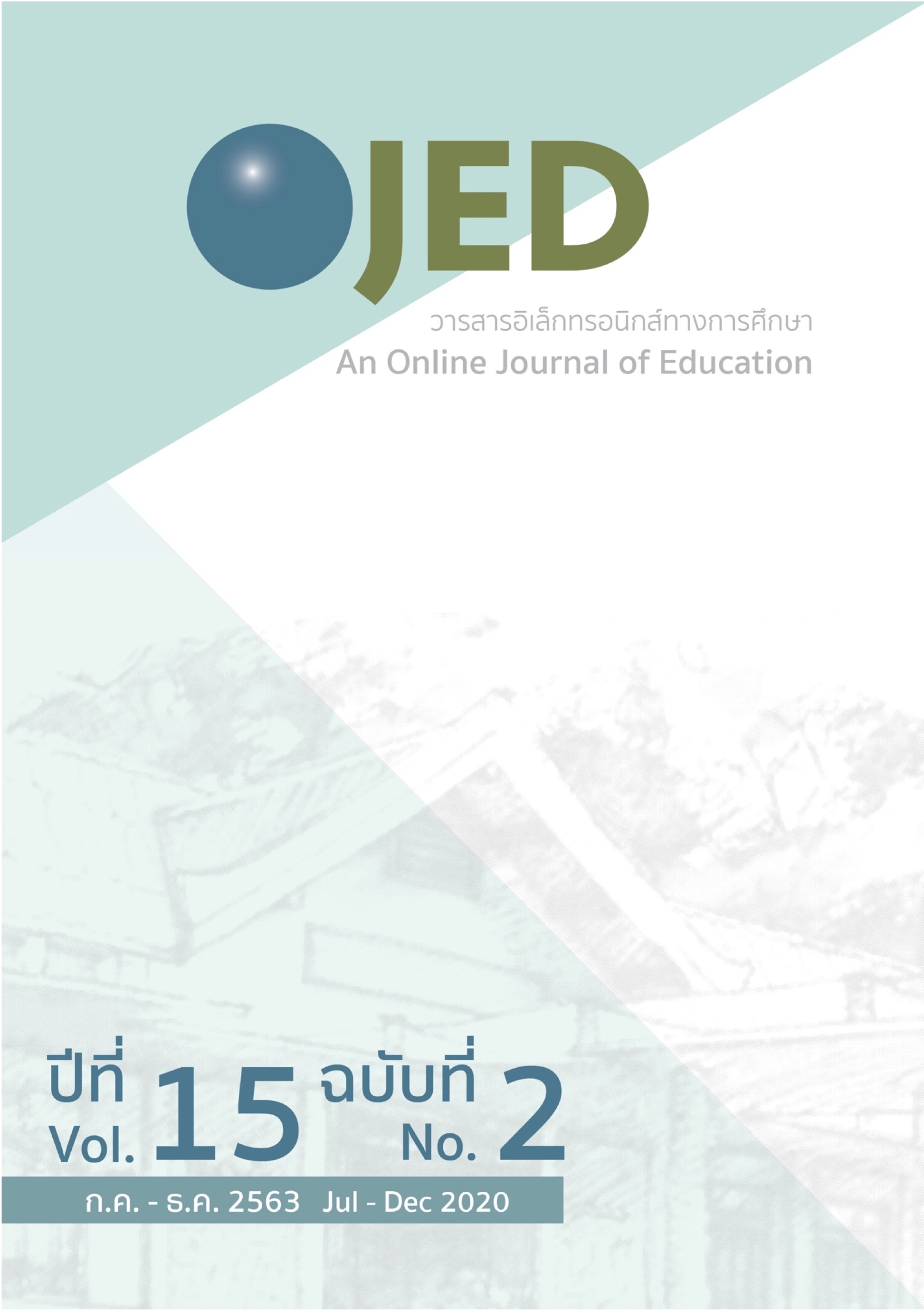The Development of a Mathematics Process Skills test for Grade 2 Students by Applying Generalizability Theory
DOI:
https://doi.org/10.14456/ojed.2020.26Keywords:
mathematics process skills, generalizability theory, G-CoefficientAbstract
The purposes of this study were to develop an instrument for evaluation of mathematics process skills, and confirm its validity. The samples of this study consisted of 180 Grade 2 students under the Office of the Northern Region Education Service Area in Thailand, selected by purposive sampling technique. The instrument used in this research was the mathematics process skills test. Data were analyzed using index of validity item-objective congruence, difficulty, discrimination, reliability and G-Coefficient.
The results of this research indicate that: 1) The researcher created 3 sets of mathematical process skills tests for grade 2 students including 12 questions about subjective mathematical process skills. 2) The quality of the instrument for evaluation of mathematics process skills of grade 2 students has content validity of questions at .80-1.00, with content validity criterion at .60-1.00, difficulty scale at .31-.66, discrimination scale at .31-.71, and reliability at .70-.72. In addition, the G-Coefficient for relative decision was .89 and G-Coefficient for absolute decision was .87.
References
กระทรวงศึกษาธิการ. (2560). หลักสูตรแกนกลางการศึกษาขั้นพื้นฐาน พุทธศักราช 2551 (ฉบับปรับปรุง พ.ศ. 2560). โรงพิมพ์ชุมนุมสหกรณ์การเกษตรแห่งประเทศไทย.
กิติยาภรณ์ สุปะทัง. (2560). การสร้างแบบวัดทักษะกระบวนการทางคณิตศาสตร์ สำหรับนักเรียนชั้นประถมศึกษาปีที่ 3 [วิทยานิพนธ์ปริญญามหาบัณฑิต]. บัณฑิตวิทยาลัย มหาวิทยาลัยราชภัฏมหาสารคาม. http://gs.rmu.ac.th/grc2017/fullpaper/file/ED-P-30.pdf
นัฐพร ตื้อจันตา. (2552). การสร้างแบบวัดกระบวนการทางคณิตศาสตร์สำหรับนักเรียนประถมศึกษาปีที่ 6 [วิทยานิพนธ์ปริญญามหาบัณฑิต]. CMU Intellectual Repository. http://repository.cmu.ac.th/handle/6653943832/25847
มลิวัลย์ ผิวคราม. (2545). การวิจัยทางการศึกษา. https://sites.google.com/site/wichakarwicaythangkarsuksa/ray-laxeiyd-wicha
ล้วน สายยศ และ อังคณา สายยศ. (2543). เทคนิคการวัดผลการเรียนรู้. สุวีริยาสาส์น.
ศิริชัย กาญจนวาสี. (2545). ทฤษฎีการทดสอบแนวใหม่ (พิมพ์ครั้งที่ 2). โรงพิมพ์แห่งจุฬาลงกรณ์มหาวิทยาลัย.
ศิริชัย กาญจนวาสี. (2555). ทฤษฎีการทดสอบแนวใหม่ (พิมพ์ครั้งที่ 4). โรงพิมพ์แห่งจุฬาลงกรณ์มหาวิทยาลัย.
สาธิดา สกุลรัตนกุลชัย. (2559). การสร้างเครื่องมือและเกณฑ์การประเมินแบบ SCORING RUBRICS.
https://www.spu.ac.th/tlc/files/2016/02/2-การสร้าง-rubric-scoring.pdf
สาวิตรี จุ้ยทอง. (2554). การตรวจสอบคุณภาพรูปแบบของชุดเครื่องมือการประเมินผลการเรียนรู้ตามสภาพ จริงกลุ่มสาระการเรียนรู้คณิตศาสตร์ ของนักเรียนชั้นมัธยมศึกษาปีที่ 1 โดยการประยุกต์ใช้ทฤษฎีการสรุปอ้างอิงความน่าเชื่อถือของผลการวัด [วิทยานิพนธ์ปริญญามหาบัณฑิต]. Strategic Wisdom and Research Institute Srinakharinwirot University. http://thesis.swu.ac.th/swuthesis/Ed_Mea
สุวิมล ติรกานันท์. (2551). การสร้างเครื่องมือวัดตัวแปรในการวิจัยทางสังคมศาสตร์: แนวทางสู่การปฏิบัติ. โรงพิมพ์แห่งจุฬาลงกรณ์มหาวิทยาลัย.
Kimberley D. L., & William, T. H. (2009). Applications of generalizability theory to clinical child and adolescent psychology research. The Journal of Clinical Child and Adolescent Psychology, 38(1), 144–165. https://doi.org/10.1080/15374410802575461
Downloads
Published
How to Cite
Issue
Section
License
Copyright (c) 2020 An Online Journal of Education

This work is licensed under a Creative Commons Attribution-NonCommercial-NoDerivatives 4.0 International License.




